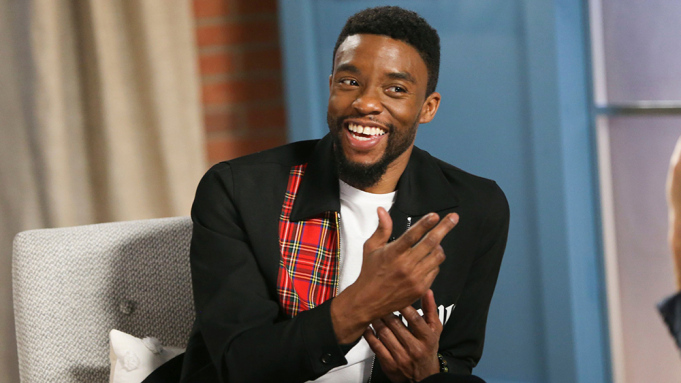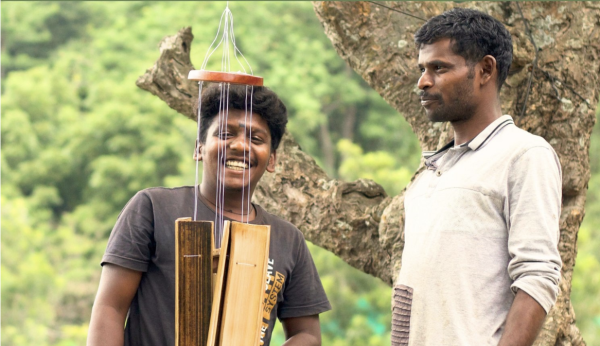Chadwick Boseman and Becoming a Hero
Chadwick Boseman smiles during an interview.
The recent death of Black Panther’s Chadwick Boseman adds more pain to a year already marked by the collective grief of Black people. Just months ago, I wrote about the unexpected death of Kobe Bryant. Since then, the Black community has been rocked by the deaths of civil rights leaders, actors, musicians, and civilians from causes ranging from illness, such as COVID-19, to police violence.
It surprised me that Boseman’s death hurt me as much as it did, but it makes sense. Despite us never having met, his fingerprints are all over my life. His work and his actions have had an outsize impact on me, and the outpouring of grief for him shows me I’m not alone in this feeling.
While I was tempted to talk about what he meant to all Black people everywhere, I found myself paralyzed at the thought of speaking to everyone’s grief. Instead, I decided to talk about my experiences: the things I felt and saw, the things that changed my life. It was the only way I could write this piece — and I needed to write this piece.
This is how I’ve decided to honor him.
42
If it weren’t for the Marvel Cinematic Universe, Boseman would be best known as a master of the biopic. His starring roles as James Brown and Thurgood Marshall, in 2014’s Get on Up and 2017’s Marshall, respectively, received a lot of deserved praise. Personally, though, his role as Jackie Robinson in 2013’s 42 will always be my favorite. He was probably better in Get on Up and Marshall, but 42 meant so much more to me.
As a kid, I was briefly in love with baseball. Not playing it or watching it — I was fascinated by the history and lore of the game. I wanted to know everything. I was amazed that Babe Ruth would eat hot dogs and drink beer between games of a doubleheader, and I was amazed that Jackie Robinson broke the baseball color barrier in 1947.
By the time 42 hit theaters, I was no longer so enamored with baseball as a sport. But I still went to see it because, by then, I realized the true significance of everything Jackie Robinson accomplished. I knew how important it was for me, as a Black man, to support a movie featuring someone who looked like me about someone who paved the way for me.
42 was my introduction to Chadwick Boseman.
Jackie Robinson, whose exploits I’d read about a hundred times, who had inspired me so much as a kid, was on the big screen looking down at me. Telling me his story. Guiding me. That’s how I experienced 42. Chadwick Boseman gave me the opportunity to meet one of my heroes. I’d thank him for that alone.
Draft Day
After his death, a friend told me they’d never seen 2014’s Draft Day. I told them that it was essentially a two-hour-long commercial for the National Football League that happened to feature Boseman. Unless you’re a diehard NFL fan, it’s completely understandable if you skip it. However, its importance to me goes beyond its quality.
Draft Day was the second time I’d seen Boseman perform. Only a year after I’d been introduced to him in 42, he was Vontae Mack, NFL hopeful. At this point in time, I was entering high school and excited for my own football career. Bold, overflowing with confidence — and most importantly, talented — Boseman as Vontae Mack was the type of player I aspired to be. With my dreams of high school, college, and ultimately NFL stardom, I once again saw myself in one of Chadwick Boseman’s performances.
I went to the theater with my dad. When we left, we overheard two adult Black men talking about the end of the movie. My dad laughed, leaned over, and said, “Grown men arguing over a movie.” That’s one of my favorite memories.
I’ve watched Draft Day more than any other Boseman film. It’s definitely not my favorite, and it’s definitely not the best. Despite that, it is arguably the one that means the most to me. It reminds me of a great moment with my dad. It reminds me of my old aspirations and some of the best parts of the person I used to be. It’s special when a piece of media can immediately take you back to a specific moment in time. Draft Day does that for me, and I owe a lot of that to Boseman.
The Marvel Cinematic Universe
I personally don’t think we will ever have the words to express how important Black Panther, both the character and the movie, are to the Black community. The impact was unmatched, unprecedented, and unparalleled. I’m struggling to describe what it meant to me on a personal level, alone. The only way I can even fathom approaching this part of his career is through anecdotes.
I had a Black Panther workout shirt. I got it after my senior year of high school and wore it under my pads for every college football game I ever played in. It made me feel faster, stronger, just better. It protected me better than any helmet ever could.
Black Panther came out during my first year in college, a week before my 19th birthday in 2018. I love the Marvel Cinematic Universe and had been excitedly waiting for the movie, but I chose to wait to see it on my birthday. When the date finally came, my friend and I got dressed up and went to the theater together. It was beautiful. Everything about the movie was beautiful.
I went again a few days later with my roommate. This time, I dressed as the character, in my workout shirt, black joggers, and black shoes. I wanted to embody him.
For me and many others, seeing a movie filled with Black people that championed Black excellence as opposed to profiting off Black trauma was life-changing.
Becoming A Hero
Chadwick Boseman was a superstar. Before I reflected on what he meant to me and so many others, I don’t know if I would’ve classified him as such. Yes, his movies were usually critically-and commercially-successful, and that’s a marking of stardom. But for whatever reason, I never saw him as the draw. I saw 42 because it was about Jackie Robinson, Draft Day because I love football, and Black Panther because I’m a fan of superheroes and was excited to see Black people thrive. With the exception of 21 Bridges, I don’t think I ever watched a movie because it featured Boseman. I don’t think I ever would have called him a superstar.
Now, I realize how wrong I was.
Chadwick Boseman wasn’t overshadowed by his roles; he brought them to life. It’s true I would’ve watched a movie about Jackie Robinson, James Brown, Thurgood Marshall, or Black Panther regardless of who played them. That doesn’t change the fact that Boseman made them count. It’s easy to say that becoming a legend would be easy if you play legendary roles, but Chadwick Boseman did the work to bring all of these legends, icons, and role models to us.
In an interview with The Atlantic, Director Spike Lee spoke on why casting Boseman to play Stormin’ Norman in Da 5 Bloods was such an easy call.
“Here’s the thing for me,” Lee said. “This character is heroic; he’s a superhero. [So] who do we cast? We cast Jackie Robinson, James Brown, Thurgood Marshall, and we cast T’Challa! [Boseman] is a superhero.”
Boseman’s career brought heroes, real and fictional, to the silver screen for us as a community to be inspired by. My whole family — from my grandmother to my little sister — were moved by him. It would be impossible to try to capture everything he meant to everyone because we all experienced and interacted with his work in different ways. What I can say is that I now know he was a superstar. He inspired a generation and will continue to inspire many more. Through his performances, Chadwick Boseman showed me what I was capable of at my best.
By bringing to life all of these characters and their legacies, he cemented his own. To me, Chadwick Boseman is as much of a hero as the ones he played.











